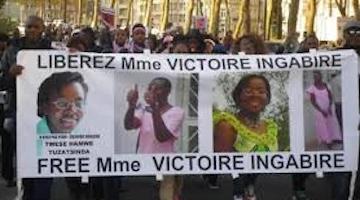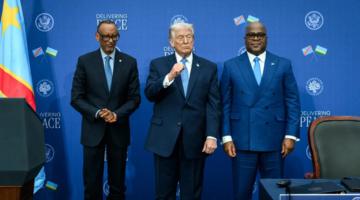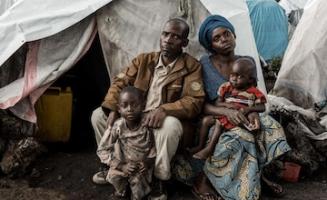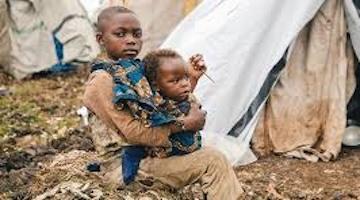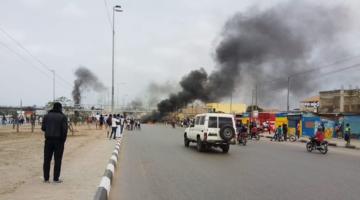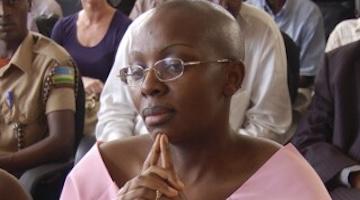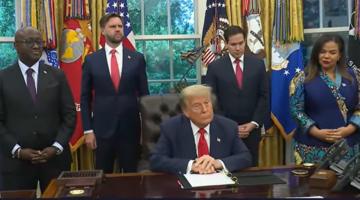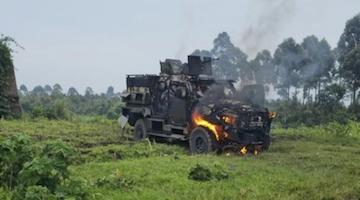Rwanda’s economic miracle is a lie.
On July 15, Rwandan President Paul Kagame will be “re-elected” in a process the world knows to be a sham. The president is well-known for ruling with an iron fist and keeping real challengers from even entering the race against him. This year both Victoire Ingabire and Diane Rwigara have been banned from running, even though Kagame frequently brags about having brought many women to positions of power.
In previous elections, since he formally assumed office in 2000, Kagame has “won” an implausible 90+ percent of the vote. In 2015, his parliament passed legislation allowing him to rule beyond term limits until 2034, and in 2017 he was awarded 99% of the vote.
At the same time, decades of UN reports have demonstrated that Rwanda is guilty of war crimes and even genocide in the Democratic Republic of the Congo.
Western donor nations nevertheless continue to fund most of Rwanda’s budget, with the World Bank being the top donor and the US the top bilateral donor. They almost always point to Kagame’s extraordinary success in developing the country and lifting his people from poverty. I spoke to Rwandan Canadian development economist David Himbara, author of “Rwanda’s Stillborn Middle-Income Economy” and other books in which he argues that Kagame’s development success is as sham as his elections.
Ann Garrison: You say that the West has struck a Faustian bargain with Kagame. Explain that.
David Himbara: For Western governments, financiers and opinion leaders, Rwandan President Paul Kagame’s Rwanda Vision 2020 offered a Faustian bargain. Overlook my brutal behavior, and I will provide you with a model for economic growth in an African nation.
As with Dr. Faustus, who sold his soul to Satan, Kagame’s admirers will be bitterly disappointed. While sacrificing human rights in the name of economic growth, Kagame delivers neither democracy nor prosperity. The IMF classifies Rwanda as one of “the poorest and most vulnerable,” a list of 25 states, including Afghanistan, Benin, Burkina Faso, Central African Republic, Chad, Comoros, D.R. Congo, The Gambia, Guinea, Guinea-Bissau, Haiti, Liberia, Madagascar, Malawi, Mali, Mozambique, Nepal, Niger, Rwanda, São Tomé and Príncipe, Sierra Leone, Solomon Islands, Tajikistan, and Togo.
The Rwandan government’s 2023 Statistical Yearbook shows that 91.3% of the working population is trapped in the informal sector where vital employment benefits such as regular salary, health benefits, social security, and pension do not apply. The Gross National Income (GNI) per capita is a mere $980. Kagame’s Vision 2020 was a fantasy.
AG: You discuss the role of former President Bill Clinton and former Prime Minister Tony Blair in promoting the myth of Rwanda’s development success. You say that they are in mutually beneficial relationships and that they need Kagame as much as Kagame needs them. Could you explain that?
DH: Kagame leverages influential connections with direct access to power. Most notably, the support of prominent figures like Bill Clinton and Tony Blair has bolstered his standing in the US and the UK. In turn, the global influence of Clinton and Blair is enhanced by their strategic alliance with Kagame, which allows them to promote themselves as global champions of the world’s impoverished masses.
Before launching the Clinton Global Initiative, Clinton secured Kagame's backing. Kagame was a guest at the foundation’s inauguration in 2005, where it raised an unprecedented $2 billion in commitments, soaring to $7.3 billion in 2006.
In 2016, Forbes, revealed that the Clintons' had amassed $240 million in the 15 years after leaving office, with $109 million of that attributed to Bill Clinton’s lucrative speaking engagements. He often touts his campaigns to fight global poverty among his achievements and cites Rwanda as an example. Blair mirrors Clinton's approach on a smaller scale.
AG: Kagame is well known for hiring public relations firms to popularize him in the West. Talk about that.
DH: Kagame has invested heavily in public relations to establish his image. Racepoint Global, a PR firm based in Boston, spearheaded the Kagame branding initiative. Kagame secured their services for $50,000 a month, in addition to out-of-pocket expenses ranging from $2,500 to $3,500 per month. He uses several other PR firms in the US and the UK.
AG: How does Kagame outright lie about his development success?
DH: I challenged Rwanda to enter the annual World’s Biggest Liar Competition in the UK. I was reacting to the Rwanda Development Board’s astonishing declaration that Rwanda “attracted US $1.6 billion worth of transformative investments” in 2022. This is disgraceful. The World Bank data and UN Trade and Development (UNCTAD) statistics showed Rwanda attracted only $399 million in foreign investment in 2022.
AG: You talk about the World Bank and its former president, Jim Yong Kim, collaborating to promote the Rwandan development miracle lie. Is that still going on under the current president, Ajay Banga?
DH: The World Bank is no longer dancing to Kagame’s tune. For example, in its June 2023 Rwanda Economic Update, the World Bank called for an investigation of why foreign direct investment figures are significantly more than actual investment. It called for an investigation into Rwanda’s embellishment of investment data.
AG: You say Rwanda’s dependence on foreign aid is the second highest in Africa. You even say that foreign aid is over 70% of its budget, although other sources cite it as 50%. How does that compare to the foreign aid received by other nations?
DH: The World Bank data on foreign aid, Net Official Development Assistance (ODA) received, shows that the net foreign aid to Rwanda as a percentage of central government expense is 74.2%. The only African countries with higher percentages are Somalia, Central African Republic, Gambia, Burundi, and Guinea.
Sadly, in 2020, the World Bank placed Rwanda among the highly aid-dependent countries whose elites siphon aid and deposit it in offshore financial centers known for bank secrecy and private wealth management. Rwanda’s elite got away with $190 million.
AG: You also say Rwanda is highly aid dependent because it imports almost everything and does little manufacturing. Have other countries managed to climb out of similar situations?
DH: Rwanda and Bhutan, by coincidence, launched their vision of becoming a middle-income country by 2020 at roughly the same time. Fast forward to 2020 - Rwanda was one of the 25 poorest and most vulnerable countries in the world, but by 2020, Bhutan had transformed from a low-income to a middle-income economy with a manufacturing base, and its Gross National Income (GNI) per capita soared to $3,181. In Rwanda, manufacturing is only 4% of total employment.
The different outcomes are not a mystery. No country is preordained to remain in poverty. With a leadership armed with a strategy and committed to implementing it no matter what, countries can achieve what we call an “economic miracle.” That is what Bhutan did.
In Rwanda’s case, Kagame paid an astonishing $50,000 per month to public relations firms to present himself as a transformative leader while doing very little for his people. Did you know that the President travels in a convoy of two luxurious Gulfstream jets, each costing $66.5 million? While Bhutan was indeed transforming itself into a middle-income country, Kagame was busy transforming himself into a king. The lives of Rwandans hardly feature among his priorities.
AG: Many Westerners visit Rwanda’s capital, where they see a clean, gleaming city with a large convention center, sports arena, and 5-star hotels with functioning Wi-Fi.
DH: Kigali appears to be an ultra-modern capital city, attributed to substantial investments made by President Kagame. This is exemplified by the Kigali Convention Centre, Africa's most costly building, with a construction expenditure of $300 million. A $2 billion airport, which will be majority owned by the Emir of Qatar, is currently in progress, poised to become a hallmark of African aviation and a significant driver of Rwanda's tourism sector.
However, this has done little for the majority of Kigali’s citizens, and looks can be deceptive. The absence of a functional waste management system in Kigali represents a looming crisis. It is imperative to recognize that the 1.7 million residents of Kigali dispose of liquid waste in pit latrines and septic tanks. Open raw sewage flows into the rivers and the marshlands of Kigali.
Daily, more than 300 tons of garbage are irresponsibly deposited into the city’s open landfills, which are located on hilltops above residential areas and schools.
AG: Tell us more about infrastructure.
DH: The percentage of households with gas or biogas as the primary cooking fuel in Rwanda is 5%. Less than 1% of the urban population cooks with electricity. The percentage of Rwandans aged between 16 and 30 attending tertiary education—beyond high school—is 3%. The rate of households owning a computer is 4%.
AG: Health care?
DH: Health care data from the 2023 Rwanda Statistical Yearbook is deeply troubling. With a population of 14 million, the healthcare workforce comprises 1,223 physicians, 286 dentists and 81 pharmacists.
AG: Electricity?
DH: The 2023 World Bank’s Rwanda Economic Update reveals that 74% of the rural population in Rwanda lacks electricity. Remember that over 80% of Rwandans live in the rural areas.
AG: Lastly, tell us about Crystal Ventures and how Kagame and his Rwandan Patriotic Front cronies built a business empire.
DH: Crystal Ventures Ltd (CVL) perfectly illustrates “state capture.” A state is captured when a narrow interest group bends public policy to serve its interests rather than those of the public. CVL is the largest business in Rwanda. I am still shocked by its monopolization of government contracts during my time working for Kagame. CVL held exclusive control over the construction of roads, bridges, sports stadiums, industrial parks, water reservoirs, street lights, and even the provision of armed security guards. President Kagame charters his two luxurious Gulfstream jets from CVL. In other words, he utilizes taxpayer funds to charter luxury aircraft from his own business.
AG: David Himbara, thank you for speaking to Black Agenda Report.
DH: Thank you.
David Himbara, a Rwandan-Canadian, is an Affiliated Scholar at the University of Toronto, Canada. With extensive experience in academia and consultancy across North America and Africa, he has served as Rwandan President Paul Kagame’s Principal Private Secretary and Head of Strategy and Policy. Himbara holds a doctoral degree in political economy from Queen's University, Canada, and has authored five books and published numerous articles while actively engaging in social media.
Ann Garrison is a Black Agenda Report Contributing Editor based in the San Francisco Bay Area. In 2014, she received the Victoire Ingabire Umuhoza Democracy and Peace Prize for her reporting on conflict in the African Great Lakes region. She can be reached at ann@anngarrison.com. You can help support her work on Patreon.

